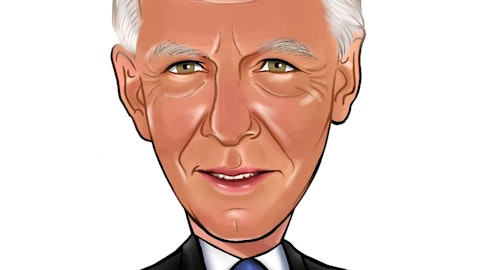Operator: That concludes today’s question. We do have a question from the line of James Faucette with Morgan Stanley.
Unidentified Analyst: It’s Michael on for James. I just wanted to ask a quick follow-up question on the modernization of NerdUp. Maybe just unpack how you’re thinking about the unit economics there? It wasn’t entirely clear to me. And then as my follow-up there, Tim, I appreciate the comments on just the composition of your sales and marketing investments and the incremental margins there. Do you think the 50-50 mix between fixed and variable cost might change as you sort of hit that natural ceiling on brand spend? Just trying to parse out how incremental margins might evolve over time? Thanks.
Tim Chen: Sure. On NerdUp, I’d describe it simplistically as on the credit card product itself, don’t make a ton of money because we’re essentially paying rewards, offering no annual fees, et cetera. Now, if people’s credit improves and they now qualify for a unsecured credit card, we do have our normal referral channels that we can refer them through and, we could potentially make money there. So that’s more of our traditional business model. So that’s kind of the exciting win-win. On the sales and marketing mix between fixed and variable, I’d say a bit of it depends. The way we look at it, you’ve got positive incremental margins on both the paid and organic side. The paid side is kind of more dependent on, how competitive we are in some of these paid channels versus others.
We certainly think long-term about this. If you can have a great registered user experience and generate long higher LTVs, then you get more and more competitive. So that could definitely be a durable advantage. Even investments in brand can help you convert. People are familiar with you and trust your brand. That can really give you an advantage there that’s structural. And then, of course, the organic side is kind of a separate thread, right? It’s going to grow at its own rate based on some of the investments we make, both in our core products as well as registration and reengagement. So, we’d love to see growth on both sides. It’s all positive incrementally, but the exact mix is going to depend on idiosyncratic factors.
Operator: That concludes today’s question and answer session. I’d like to turn the call back to management for closing remarks.
Tim Chen: All right, thanks all for your questions today. Feel really energized about the opportunities ahead. So, we’ve got continued strength of our reach and brand and our focus on relentlessly improving consumer experiences. And that really positions us to capture even more mindshare and feel our business for long term growth. I wanted to give a huge thanks to the Nerd for their hard work this quarter to help more people pull in more ways. And at the same time, we remain dedicated to creating value for our wider community reflected in the ESG report we published yesterday, which is available through our IR website. I encourage you to read our report to learn more about NerdWallet’s commitments. And with that, we’ll see you next quarter.
Operator: This concludes today’s conference call. Thank you for participating. You may now disconnect.
Follow Nord Resources Corp (NASDAQ:NRDS)
Follow Nord Resources Corp (NASDAQ:NRDS)
Receive real-time insider trading and news alerts



